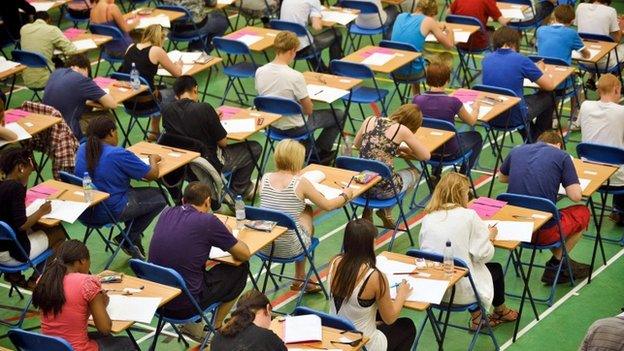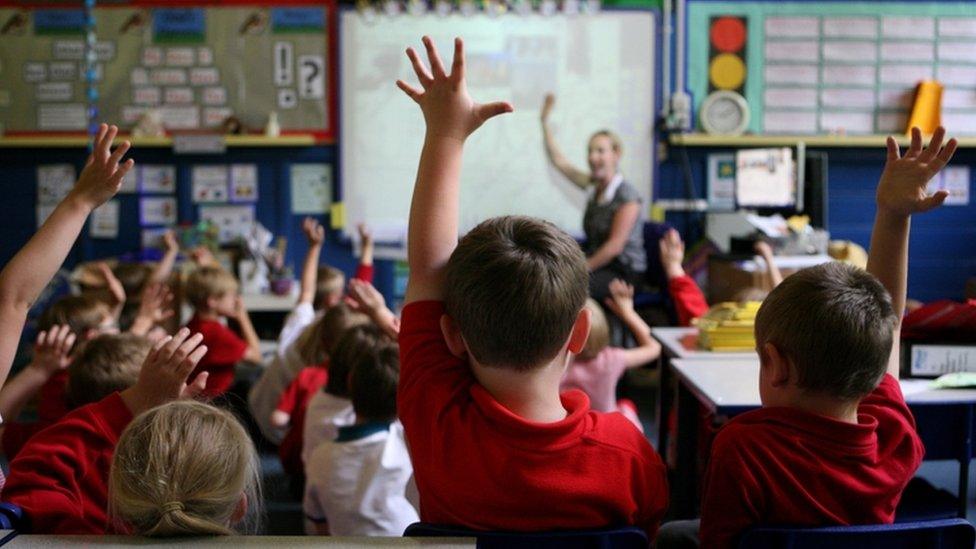Spending Review: School funding to be overhauled
- Published

School funding will be overhauled and there will be more student support for further education
The funding of schools in England will be overhauled to remove big regional differences in levels of per pupil funding, George Osborne has confirmed.
The chancellor said education was the "door to opportunity" and announced a new national funding formula from 2017.
Mr Osborne also gave details of an employers' levy for apprenticeships, which would raise £3bn.
But the National Union of Teachers warned that despite removing anomalies, schools would still face funding cuts.

Spending review for education and family
National funding formula for schools from 2017
Repayment threshold for student loans fixed until 2021
More loans for further-education, part-time and postgraduate students
Free childcare of 30 hours, with a threshold of parents working at least 16 hours week and earning less than £100,000
An upper income limit of £100,000 on tax-free childcare
Sixth-form colleges to become eligible for academy status
Further-education college spending on adult skills protected in cash terms
Apprenticeship levy 0.5% of employers' wage bill to raise £3bn per year
£23bn in building extra school places
National Citizens Service to be expanded to 300,000 places
Student opportunity fund to recruit poorer students to be halved
The changes to the allocation of school funding will set a national rate for each pupil, with extra funding for those with additional needs.
It is an attempt to address the substantial differences in funding levels that had developed, with some parts of the country receiving much lower levels.
Graham Stuart, former chair of the education select committee, has been campaigning for this change and said "in principle this represents a huge step forward".
Teachers' unions said that despite redistributions of funding, the overall national picture remained a forecast fall of 8% in real-terms school budgets.

The chancellor says that 250,000 students will benefit from changes to loans
The reallocation could mean a big loss of funding for London boroughs, said the NUT.
"There are no winners and losers under the government's funding proposals - there are only losers and even bigger losers," said the NUT's Kevin Courtney.
The Local Government Association said councils had been calling for a fairer funding system, but there would be losers and so any changes should be "introduced in a phased way to protect those schools facing a relative reduction in budgets".
School budgets are protected, but there will be cuts to other educational support services - and the LGA warned of £600m being taken from budgets for services such as speech therapy, physiotherapy, occupational therapy, music and checks on staff.
The total financial support for education and childcare is to increase by £10bn over the next five years.
Mr Osborne gave details of an employers' levy to fund apprenticeships. He said it would be 0.5% of the wage bill and would raise £3bn per year, but would only apply to bigger employers with wage bills over £3m.
He confirmed the proposals for 30 hours of free childcare for three- and four-year-olds, but with a threshold of parents working at least 16 hours per week and earning less than £100,000.
The chancellor said 250,000 students would benefit from extra loans - for tuition fees for students studying for higher level skills in further education, part-time students and postgraduates. These loans would be worth £1bn by 2019-20.

The student opportunity fund is to be reduced by half, says the BIS department
Mr Osborne said there would be no cuts to "core adult skills funding for further education colleges - we will instead protect it in cash terms".
Although a statement from the Department for Business, Innovation and Skills announced "£360m of efficiencies and savings from adult skills budget".
Martin Doel of the Association of Colleges said the spending review would be a "huge relief for further education and sixth form colleges following five years of stringent budget cuts".
Sixth-form colleges would become eligible for academy status, added Mr Osborne, which would affect about 100 colleges.
In higher education, the student opportunity fund, used to recruit and retain poorer students, is to be halved, as part of a £120m cut in the teaching grant by 2019-20.
The threshold for the repayment of student loans, for those who will pay back the £9,000 per year fees, has been fixed until 2021.
Martin Lewis, founder of MoneySavingExpert.com and former head of the Independent Task Force on student finance information, described it as a "disgraceful move and a breach of trust by the government that betrays a generation of students".
The review confirms that maintenance grants will become loans - saving £2bn per year - and the Department for Business, Innovation and Skills says university income will rise by £2.3bn with increased numbers of students, including from overseas.
Nick Hillman, director of the Higher Education Policy Institute, said: "The Spending Review could have been worse for universities and students than it has turned out to be.
"The improvements to postgraduate loans, the new support for part-time students and the protection of research spending are all welcome and better than many people feared."
But Chris Keates, leader of the Nasuwt teachers' union, said: "We have heard it all before about guaranteeing to protect the schools budget. As ever, the devil will be in the detail."
Autumn Statement and Spending Review 2015

Presented by Chancellor George Osborne, the Spending Review sets out what government spending will be over the next four years, while the Autumn Statement is an annual update of government plans for the economy.
Explained: Which government departments will be affected?
Analysis: From BBC political editor Laura Kuenssberg
Special report: Full in-depth coverage of the Spending Review and Autumn Statement

- Published25 November 2015

- Published22 November 2015

- Published15 June 2015
